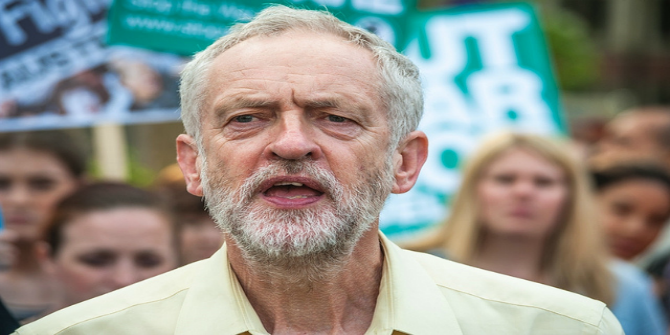
 Press freedom is accepted as a cornerstone of a healthy democracy. Yet with the rapid evolution of social media, limiting inaccuracies and maintaining privacy must also be considered against this freedom. Tim O’Riordan and Lisa Harris review the 2017 manifestos and outline the parties’ approaches to regulating the press, the internet, and tackling fake news.
Press freedom is accepted as a cornerstone of a healthy democracy. Yet with the rapid evolution of social media, limiting inaccuracies and maintaining privacy must also be considered against this freedom. Tim O’Riordan and Lisa Harris review the 2017 manifestos and outline the parties’ approaches to regulating the press, the internet, and tackling fake news.
When the Prime Minister announced a snap election on 18 April, it was business as usual on social media. With the revival of 2015’s #coalitionofchaos, new Brexit-inspired calls to #CrushTheSaboteurs, the anti-Conservative #LetJuneBeTheEndOfMay, and Nigel Farage’s claim that he would ‘pick up a rifle’ if there was a U-turn on Brexit, it appeared the usual hashtag-based grandstanding was set to replay itself as it has since the 2010 election. But with the release of the main party manifestos, it appears this may be the last UK election where ‘anything goes’.
An interesting comparison can be made between the growing power of digital technologies today and the transport revolution as the motor car began to make its mark back in Edwardian times. The role of Minister for Transport was created in 1919, and by the 1930s gridlocked streets had become the norm. Legislation was eventually passed to regulate traffic with driving tests, parking restrictions, the highway code and traffic light systems. Similarly, social media communications have evolved from trivial pastime to global phenomenon influencing all aspects of our lives, with government regulation supposedly now in the pipeline.
While the Liberal Democrat and Labour manifestos make polite noises about maintaining the ‘open internet’, and ‘protecting personal privacy’, the Conservatives are directing their rhetoric at the need to control social media. Their manifesto promotes a strongly interventionist approach to the digital realm, asserting that ‘we will choose how technology forms our future’, and proposing legislative measures “to protect the reliability and objectivity of information” on the Web.
As with all manifestos, it is short on detail on how proposals will be accomplished, but the sentiment chimes with recent moves by technology intermediaries to tackle the ‘fake news’ phenomenon. The all-party Culture, Media and Sport Commons Select Committee started an inquiry into ‘fake news’ in January this year. The dissolution of Parliament for the General Election meant the Committee did not have time to report, but more than 70 written statements were put forward, including submissions from Google, Facebook, major terrestrial broadcasters, and academic institutions.
As the meaning of the term ‘fake news’ is vague, the Committee asked for clarification. Definitions of ‘fake news’ submitted by contributors varied, from the BBC’s emphasis on ‘false information deliberately circulated by hoax news sites’, to more sophisticated attempts to describe the phenomenon such as the Royal Statistical Society’s inclusion of “news which misuses statistics to reach incorrect conclusions”, and the News Media Association’s reference to “a form of abuse against news sources someone doesn’t agree with”.
While the technology firms reiterated to the inquiry their various attempts to address issues arising from ‘fake news’ using algorithmic methods, none of the contributors supported immediate government action or regulation. There was also consensus on the importance of improved digital literacies education, and the growth of free tools developed to help detect and monitor the spread of fake news, such as Indiana University’s Hoaxy. Facebook itself has recently hired 3000 extra content checkers and produced a guide detailing its own efforts to combat the problem.
As the largest social media network in the world, Facebook alone now has nearly 2 billion active monthly users. Within a week of the manifestos being launched, BuzzFeed News Social Barometer reported that the Conservative manifesto had been shared on Facebook 17,000 times since its launch, compared to Labour’s 63,000. The BBC have also highlighted the disparity of social media followings of both main party leaders, with Corbyn’s official page boasting 930,000 likes compared with Theresa May’s 380,000. In a video posted on YouTube, Facebook, and Twitter, Adam Knight of Labour’s Digital Army noted that although right-wing press headlines dominate what people see in supermarkets and petrol stations, social media activism has the potential to reach a wider audience.
What are the Prime Minister’s expressed views on this subject? In the weeks leading up to the manifesto launch, Theresa May toured local newspaper offices around the UK supporting the News Media Association’s ‘Fighting Fake News’ campaign and issuing warnings of the dangers of disinformation distributed on social media. Speaking to the Sussex Express, May said: “we have got a situation … where anybody can put something on [a] social media site as if it’s real without anybody checking. People need to recognise that you can’t trust everything you see on social media”.
The Conservatives proposed clampdown on social media has the appearance of a comprehensive online censorship system along the lines of the German Chancellor Angela Merkel’s proposal to make publishing fake news a criminal offence. Whereas elsewhere in their manifesto they are committed to watering down regulation of the press, by dropping part 2 of Leveson and repealing Section 40 of the Crime and Courts Act 2013, the Conservatives focus on social media appears to betray a strong political bias towards their supporters in the press. As Paul Bernal writes in his blog: “The Daily Mail will have more freedom than blogging platforms, Facebook, and Twitter – and you can draw your own conclusions from that”.
One conclusion that could be drawn is that an outcome of this election might be the end of the ‘anything goes’ culture on social media. Effectively tackling ‘fake news’ appears to be in the best interests of any healthy democracy, but whether this is best addressed by technology intermediaries themselves, by improved education in digital literacies, or by government regulation remains to be seen. Too little action may lead to greater levels of fantasy in the public realm, too much could allow government to impose the views of powerful vested interests.
______
 Tim O’Riordan is a PhD candidate at the Web Science Institute at the University of Southampton.
Tim O’Riordan is a PhD candidate at the Web Science Institute at the University of Southampton.
 Lisa Harris is an Associate Professor in Southampton Business School, Director of the Web Science Institute and of the Web Science Centre for Doctoral Training at the University of Southampton.
Lisa Harris is an Associate Professor in Southampton Business School, Director of the Web Science Institute and of the Web Science Centre for Doctoral Training at the University of Southampton.









I agree and we must have a culture of caring for everyone and we must really make sure diversity and inclusion matters and we must care for most vulnerable people of our society and they are old, elderly with multiple co-morbidity, Black and Ethnic Minority (just look at Muslim population and deprivation) and people with Dementia and we must care for public sector staff like social services and NHS and make sure they are paid will and stop wasting money by appointing right leaders and most important HOLD LEADERS TO ACCOUNT
What is missing in current NHS is accountability for doctors, nurses, managers and leaders whose behaviour or poor care gives rise to concerns and they are moved from one place to another! This puts patients, staff and Public sector at risk and lot of money is wasted.
Even BMA and Colleges leaders have no accountability for their own behaviour. Some are very good and make me humble but number of arrogant leaders I have met is shocking. College Professors are experts and we have a misconception that all experts are leaders! I have met many arrogant professors, academic people, lawyers and head-hunters and also politicians that it is shocking and none of them have accountability!
They move from one place to another and destroy many human lives. Plight of some Black and Ethnic Minority doctors and staff in NHS is shocking! Let us make our great nation a great Britain by caring for each other and let us start with leaders and for that we must appoint right value based leaders in the first place and provide them with training of being a good leader and then hold everyone to account! Let us make this country wonderful nation and let us begin in Health and social care.